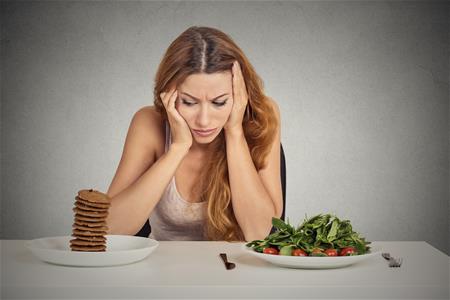Link Between Carbs and Depression.
Anxiety and depression are often treated with medications that alter the effect of a mood hormone called serotonin. When serotonin levels in the brain are high, people are calm, patient, and optimistic. When levels are low, you can suffer from anxiety, depression, or become irritable. Is it possible to change this with diet? Yes! You can’t feel good on fried stuff and over salted snacks, you just can’t! With that, we want to show you the crazy link between carbs and depression.
Serotonin is made in the body from an essential amino acid called tryptophan with the help of nutrients such as folic acid (think beans and greens as good sources), vitamin B6 (cabbage, cauliflower, broccoli, kale, collards, garlic), and vitamin C (papaya, bell peppers, broccoli, papaya, strawberries). Unfortunately, tryptophan happens to be the least plentiful of the common amino acids in the typical diet.
Tryptophan has to work hard to get to the brain and make serotonin. Unfortunately, approximately 1% of ingested tryptophan ends up in the brain, and unless people are eating lots of fruits and vegetables rich in folic acid, vitamin C, and B6, the conversion to serotonin might not be too good.
1. Eat produce at every meal.
Eat more fruits and vegetables and less meat as a protein source. Complex carbohydrates stimulate the secretion of insulin at a steady rate from the pancreas. Insulin acts like a key to allow muscles to suck up the amino acids that compete with tryptophan for passage into the brain. With less competition at the blood brain barrier, then significantly more tryptophan passes easily where it is needed most. This may be why depressed people naturally crave carbohydrates: to stimulate the production of more of the anti-depressant neurotransmitter serotonin. The key to this process is making sure these are unrefined, low glycemic load (raise blood sugar slowly) carbohydrates like beans, fruits and vegetables, and whole grains. Refined carbohydrates and sugar-laden foods like pastries, sweetened cereals, beverages, or candy can cause a quick spike in insulin. This may cause an opposite effect of having tryptophan being converted to things other than serotonin. Meat contains higher amounts of the amino acids that compete with tryptophan to become serotonin. Vegetarian meals allow for higher serotonin levels in the brain.
2. Eat plenty of the fruits and vegetables
Ones that contain the nutrients to help in the conversion of tryptophan to serotonin. For example, broccoli is a good source for folic acid, vitamin C, and vitamin B6. All dark green leafy vegetables are very beneficial.
3. Stay away from foods that irritate your upper intestinal tract.
Most people who have reactions to either dairy (casein, whey, and/or lactose), or gluten (wheat, barley, rye) often have compromised digestion and absorption in the upper intestinal tract. Unfortunately, this may leave them with lower amounts of important mood nutrients such as tryptophan and folic acid in their bodies.
4. Realize that the consumption of gluten may alter mood.
Even the National Institute for Health recognizes that one of the most common symptoms in children with gluten sensitivities is behavior change including ADD/ADHD like behavior. Eating gluten effects the villi in the small intestine used to absorb nutrients, you therefore may end up with nutrient deficiencies.
5. If depression, anxiety, or insomnia is persistent, please consult your health care practitioner about nutritional supplementation or further testing.
Many alternative practitioners consider recommending supplemental tryptophan, 5-HTP (5-hydroxytryptophan), D, 5-MTHF (5-methyltetrahydrofolate), vitamin B6, and other nutrients as well as dietary change.
6. Cut out Chemicals.
We, as humans were not meant to eat all of the chemicals that are in the processed foods in the form of preservatives, artificial flavorings and colorings. These ingredients increase the toxic load in our bodies and affect you both mentally and physically.
7. Eat the colors of the rainbow.
Eating produce of all colors helps to ensure that you are eating a variety of vitamins and minerals. When you are deficient, it can lead to tension, depression, anxiety and mental fogginess.
8. Avoid Alcohol.
Now, you knew this one was coming!! Alcohol is a depressant. It can heighten or cause both anxiety and depression. Studies have also shown that it can suppress the metabolism for at least 24 hours. We hope you enjoyed this mind-blowing experience of learning about the link between carbs and depression.
Questions? Contact us today.


